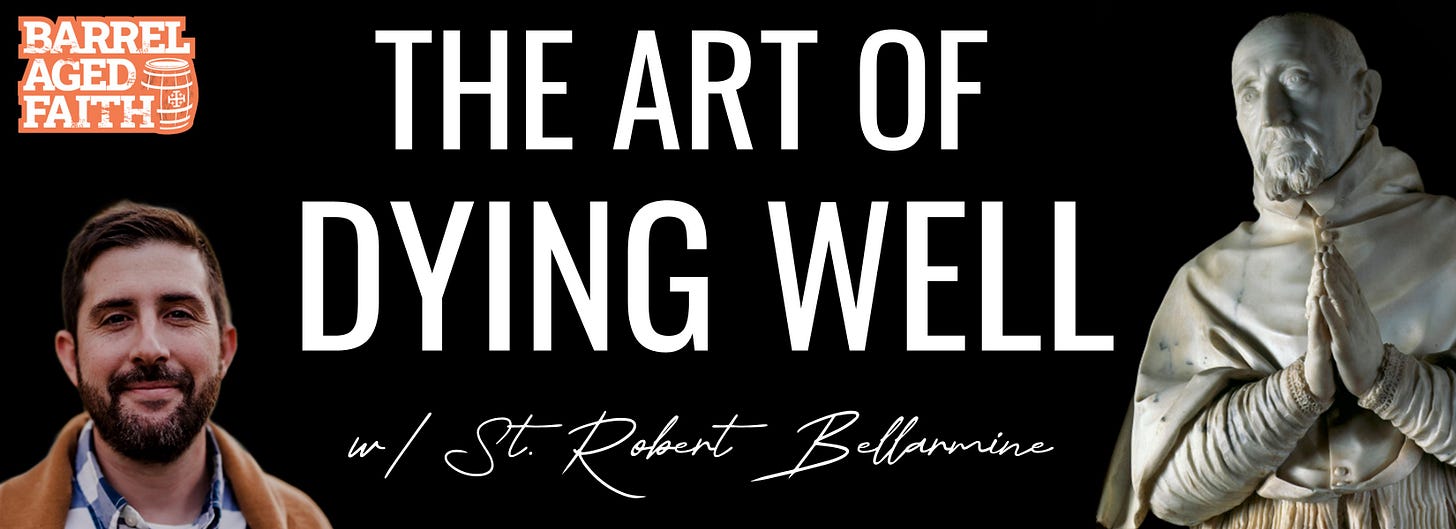Day 1 : Lent & The Art of Dying Well (2/22)
40 Days with St. Robert Bellarmine, the Bible, & the Fathers
Ash Wednesday and the season of Lent is upon us! As we gather together at church to begin our 40 day fast leading up to the Feast of the Resurrection (Easter), we are reminded that life is not a vacation on a cruise ship, but rather a cosmic war on a battleship. Satan’s main goal is to convince us that life is endless pleasure and comforts, while Jesus rebukes him and teaches us that certain evils in us, our families, and world will not be exorcised without prayer and fasting (see Matthew 17:19). On this day (in the Western Tradition), we abstain from meat and try to limit our eating (the minimum being about half the calories we typically eat; some people simply do one meal or some bread and water). As ashes are placed on our foreheads in the form of a cross, we hear the words recited over us, “Remember that you are dust and to dust you shall return” (See Genesis 3:19). These words reminds us that Lent involves more than preparing for Easter but has something to do with our own transformation, repentance and ‘remembrance of death’ (Memento Mori in Latin = Remember Your Death). Memento Mori was a phrase that was meditated upon daily by many monks and saints throughout church history not because they were fixated on death or detachment from the body in an unhealthy, Gnostic fashion, but rather to heighten their awareness of what ultimately matters. In other words, Lent is a time to reset the compass of our souls so that it accurately points north or heavenward.
For this reason, I will be sending you daily readings (if you subscribe) from the classic book, “The Art of Dying Well,” by St. Robert Bellarmine. When he wrote this book, he wanted to summarize the teaching of the Bible and the church fathers on the meaning of death, which paradoxically involves both a curse and a blessing. Death is a curse, because it is a fruit of sin or detachment from God. God did not create death, intend death, or delight in death (see Wisdom 1:12-14), but death came as a result of our primordial parents trusting themselves over God. If you rebel against the Author of Life who completes you as human being, then you get death or everlasting non-being (a.k.a. Hell).
However, death is also a blessing, because Christ’s death transformed the experience forever. Through His death, he slayed the power of death, and its hold over us. It is through our death ‘in Him’ that we will arrive Home, finally be free of sin, and behold the Triune God in the Beatific Vision forever. As C.S. Lewis would say, “Further up & Further in!” We will ascend and joyfully participate in the infinite life of God without end. Because of Christ, death is no longer a dead end alley, but a passage way to everlasting life. Christ has opened up a whole new future of possibilities including our own bodily resurrection in a renovated Creation when He returns gloriously to our world (See 1 Corinthians 15).
Although death has been transformed as a source of hope, many of us Christians rarely think of it, or if we do, it is a source of crippling anxiety. Because we love comfort too much or because we trust ourselves more than God or because we have been traumatized, WE NEED LENT to remind us that we are both mortal and in need of Christ as the anchor of our souls.
I can still recall the first time I learned about the ancient Christian practice of fasting during Lent. I was in college and a friend of mine came back to the dormitory with a smeared cross of ashes on her forehead. I enquired what had happened to her, and she said that Lent was beginning. Although I grew up in a devout Christian (Baptist) household, I didn’t know what she meant and thought she was talking about ‘lint in the dryer.’ She explained to me the concept of Ash Wednesday and giving up something you hold dear for 40 days until Easter arrives. Her explanation not only became my introduction to Lent, but also to the concept of liturgy itself and getting caught up into the worship calendar of the Ancient Christians!
In old English, the word Lent refers to the Spring season. For much of church history, the ‘40 days’ was simply referred to as the ‘Great Fast’ leading up to Pascha (Easter). Historically, we hear it first discussed at the Council of Nicaea I in 325 AD. Theologically, Lent is a time for us to imitate Christ’s 40 days in the desert that prepared Him for His ministry, His death, and His resurrection. It is a season of repentance and preparation as we look forward to celebrating the Resurrection, the greatest event of human history! Of course, we celebrate the Resurrection every Sunday which is the day Christ rose from the grave, but Easter is the Sunday of Sundays, when we celebrate the Resurrection with great festivity! In the same way, Good Friday is the Friday of Fridays when we commemorate the death of our Lord with greater solemnity, sorrow, and repentance.
Along with meditations on the writings of St. Robert Bellarmine on “The Art of Dying Well,” I will also include some historical and theological insights on Lent and ancient Christianity. I pray that these reflections not only enrich your connection to our family tree of saints, but most importantly, your relationship to the Risen Christ. As we put aside bodily pleasure for a time, we are reminded that we are to be mastered by nothing except our Lord Jesus Christ!
Be entirely and forever His,
Kyle A. King


